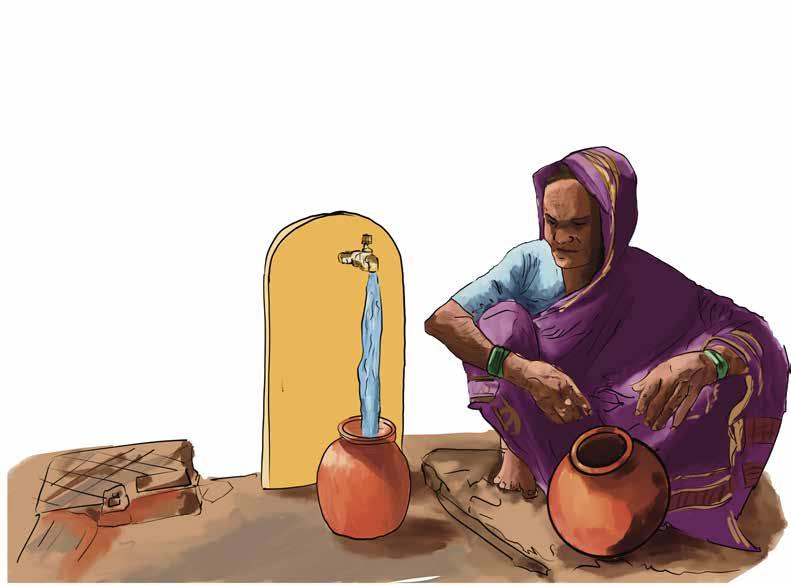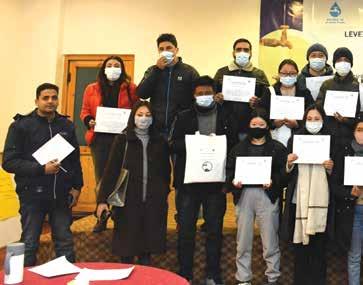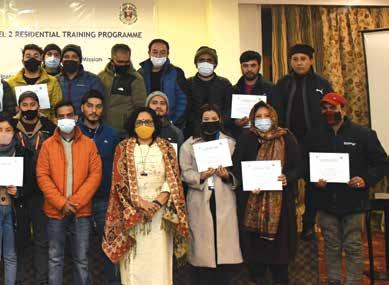
8 minute read
Strengthening communities, local bodies for improved water supply
from Project Update 2022
by Urban Update
AIILSG has been empanelled as Key Resource Center (KRC) under Jal Jeevan Mission to support capacity building, reorientation of different stakeholders, dissemination of knowledge and information, development of high-quality print and audio-visual content, documentation of best practices, etc. for Level-1 (Senior management), Level-2 (Middle Management) and Level-3 (Community management)
Advertisement
u
nder the leadership of Prime Minister Narendra Modi, India embarked on a historic journey in 2019 with the setting up of the Jal Shakti Mantralaya -by integrating two of the largest government departments dealing with water: The Ministry of Water Resources, River Development and Ganga Rejuvenation, and the Ministry of Drinking Water and Sanitation. This bold step for institutional integration brought together two key departments to strengthen efforts for a holistic approach to the water sector.
The Jal Jeevan Mission (JJM) was launched by the Prime Minister of India Narendra Modi on 15th August 2019, from the ramparts of the Red Fort. The mission, currently under implementation, in partnership with the states, aims to enable every household in villages to have a Functional Household Tap Connection (FHTC) in the next five years with adequate quantity (at least 55 lpcd) of prescribed quality on a regular and longterm basis. The JJM also seeks to promote the holistic management of local water resources. It is for the first time that a water supply programme addresses the need to sustain water sources with conservation and reuse measures made mandatory in the scheme designs.
The unique part of this mission is to focus on the community participation and community approach. The Ministry of Jal Shakti is giving equal importance to the implementation part as well as on the information, education and communication (IEC) as a key component for social and community outreach of the mission’s objectives. In order to enable the learning and information component of the mission, Jal Shakti Ministry along with various prestigious and profound institutes and organisations is conducting series of training and capacity building program for different level of officials to ensure the timely implementation and sustainability of the mission. These institutes or organisations are namely notified as Key Resources Centres (KRCs) and are responsible for knowledge sharing and to enhance the skills set of engineers, officers and different committees involved in this schemes. The major component of these trainings program is centrally funded. However, the states and union territories are entitled to utilise 5 per cent of the project’s budget for the same.
Apart from the KRCs, the Implementation Support Agency (ISA) also plays a prominent and critical role in the planning and community support for success and ensure the sustainability of the mission. Though major infrastructure development cost for establishing fully functional household tap connection is coming out of government’s pocket, the mission has a provision of 5 per cent payment by the households for the installation of the tap connection and responsibility towards the operations and maintenance of the connection after installation by the community. This seems to be a bottleneck in long term vision of the mission and at this stage the ISAs steps in as mediators to aware and educate community to implement the Jal Jeevan Mission.
Role of AIILSG
In this current financial year 2022-23, as one of the KRCs, the institute has been awarded training programs for all the states and union territories for Level 1 and 2 officials and 22 states for Level 3 officials under the mission. AIILSG is also functioning as ISA in the Mulshi Block in Pune district of Maharashtra and supporting 60 villages in the implementation of the Jal Jeevan Mission initiatives. » Development and implementation of capacitybuilding programs for creating a team of
“responsible and responsive leadership skills.” » Facilitate participants for better engagement
JJM is not a scheme but a ‘People’s Movement’ wherein community participation is the key. The UT had increased its water supply coverage from 3 per cent to 30 per cent in a short span. Ladakh strongly believes in ‘Community Participation’ and that they have not received any major complaints regarding the implementation of the scheme so far. handing over the powers, functionaries, funds, and functions to the community will be the most significant achievement and ensure the scheme’s success
Ajeet sahu Commissioner Secretary, Ladakh
which enhances their knowledge and awareness » Knowledge sharing on new practices in the field of water management and sanitation » Stimulate cross-learning about the latest technology and best management practices in the water sector by organizing exposure visits for the decisionmakers who can get benefited » Implement the same to bring the desired change in society » Development of high-quality video and audio reading and other learning materials, for better understanding of participants In FY 2021-22, training programs were conducted in regions of Ladakh, Karnataka and Maharashtra under L1 and L3. To implement the mission, institutional arrangements at various levels have been made and each state’s PHE/ RWS Departments are to
1
play a critical role. They have to help Gram Panchayats (GP) and/or its sub-committee in planning, implementing, managing, operating and maintaining their in-village water supply systems.
JJM is implemented through institutional mechanism at four levels
Successful implantation of the JJM programme is crucial to completing these tasks. To ensure sustainable sanitation and safe and sustainable water supply from provided water facilities, Implementation Support Agencies (ISA) have been introduced as a mediator. AIILSG is engaged as an ISA in the states of Chhattisgarh, Maharashtra, and Jharkhand. There was a need to provide sustainable water supply facilities in the rural areas of these states and create awareness at the village level for continuous usage of water.
The role of AIILSG includes community mobilisation & up-gradation of existing committees, support to resolve problems, village-level training programs, support for documentation and cover success stories, preparing Village Action Plan (VAP), support to prepare estimation, implementation, operation and maintenance (O&M) work, support in pre-planning/ planning/ implementation and O&M.
Training programs conducted
A series of training programs for over 500+ officials of Maharashtra, Karnataka and the UT of Ladakh has been organised by the AIILSG under the JJM.
The training programmes were conducted in both the online and residential modes. The training focused on various aspects of the Mission including, ‘Participatory planning, implementation & operation and maintenance of rural drinking water supply project under JJM’, ‘Operation and management of water supply system to achieve sustainable, equitable, consistent, economically
National Level
National Jal Jeevan National Jal Jeevan Mission (NJJM) Mission (NJJM)
3
District Level
District Water & Sanitation Mission (DWSM)
2
State Level
State Water & Sanitation Mission (SWSM)
4
Gram Panchayat
Village Water & Sanitation Committee (VWSC) / Pani Samiti / User Group etc. viable safe and low energy consuming technologies’, ‘Best practices on rural water resource management’, and ‘Sensor-based IoT systems for monitoring rural water supply’. Team AIILSG also organised field visits for the officials in the respective states to replicate successful models in their towns.
The programmes majorly focused on the rural areas of Karnataka, Maharashtra and Ladakh. Eminent trainers, including Waterman of Odisha Ranjan Panda, and Dr Bhakti Devi, National President, Water Resource Council, were engaged.
The Level 2 residential training program was inaugurated under the gracious presence of P Vishwakannan, Director (JJM-V); Tsering Anchuk, Deputy Chairman, LAHDC Leh; Shrikant Balasaheb Suse, Deputy Commissioner/CEO, LAHDC Leh. The Chief Guest from the Ministry, during his initial remarks, mentioned that Jal Jeevan Mission has brought transformational changes in UT Ladakh by providing water at sub-zero temperatures. He lauded the efforts of the JJM team in Ladakh headed by the Commissioner Secretary Ajeet Kumar Sahu for the successful implementation of JJM. Director, JJM-V, P Vishwakannan shared that IT-enabled systems help in monitoring various parameters such as quality, quantity, and regular supply of water on a long-term and sustainable basis. In his concluding address, Vishwakannan, thanked AIILSG for organizing the program. He stressed the importance of documentation and urged AIILSG and other stakeholders to document all the processes, procedures and best practices followed in the region and the training as well. This, he said, can be used to showcase the successful

Certification ceremony after capacity building program of L2 officials in Leh
Role of Implementation Support Agency-ISA
Operation & Maintenance Planning
Implementation
The planning stage is of total 5 months including pre-planning of the project
The Implementation phase of the project is of total 10 months
The Operation & Maintenance- O&M phase is of 3 months.
implementation of the JJM programme in such harsh climatic conditions.
Ajeet Kumar Sahu, Commissioner Secretary, Ladakh, said, “JJM is not a scheme but a ‘People’s Movement’ wherein community participation is the key.” He underlined that the UT had increased its water supply coverage from 3 per cent to 30 per cent in a short span. He expressed his pleasure that Ladakh strongly believes in ‘Community Participation’ and that they have not received any major complaints regarding the implementation of the scheme so far. He added that handing over the powers, functionaries, funds, and functions to the community will be the most significant achievement and ensure the scheme’s success.
The training programmes aimed to increase community participation and achieve the targets under JJM. The trainers underlined the possible challenges for officials while working with the beneficiaries. Trainers conducted interactive sessions to understand the ground realities and provide them with tailormade solutions. The officials received training to map maximum clusters of houses to develop an integrated and comprehensive action plan. They were also suggested to revisit the villages and carry out this activity to fill gaps in existing projects. This process will ensure the investment and participation of people from all sectors of society. Participants were provided with training on involving the concept of resource mapping for the smart implementation of the scheme.
The sessions had regular live quiz sessions on Mentimeter, an Interactive Presentation Software, to engage the trainees further. Using the platform, trainers asked the participants questions and recorded answers in real-time to gauge officials’ understanding of topics covered in the training sessions. During the training programmes, participants formed multiple groups. These groups were asked to present their unique ideas on increasing community involvement and using innovative technologies introduced to tackle the challenges of establishing a potable water supply at the household level. Each session involved detailed discussions on queries put forward by the participants.
At the end of each session, participants were asked to submit their feedback with the help of emojis available on the platform and with a form link shared with them. This way, the trainers improved the training methodology in upcoming training sessions.











